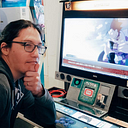How can I see my self-improvement in fighting games?
[One perk of supporting me on Patreon: you get access to a supporter-only email address you can use to ask me questions! If you want some fighting game coaching, consider joining the crew.]
I got a real good question from someone about on my post about crosstraining in Smash, so I figured I’d share the answer for y’all in case it’s useful to you.
I’m gonna try out some crosstraining, but I have a question: how do you measure that you’ve actually gotten better? I can be exceptionally bad at seeing self improvement without some way to measure it. -Justin
Great question, Justin! I think there are two different useful answers to this question.
First, let’s start with the practical answer: There is no clear, reliable indicator of your skill as a player, so looking for a way to measure your ability is the wrong way to think about it. You could look at your tournament results, or your online ranking points, or your results in a ft10 set vs Daigo that you play every week under the exact same conditions; none of these things will tell you conclusively that you’re a better or worse player, and there are too many ways that these indicators can mislead you if you’re trying to use them to make decisions about how to change up your game.
Instead, you’re going to need to identify specific things that will make you a better player, and find ways to measure those.
One of the examples I talked about in the crosstraining article was “I autopilot too much during XYZ situations.” I know that autopiloting is not good in general, and the XYZ situations are ones that stand out in my memory as the ones where I get blown up for autopiloting. So when I’m playing, I’ll keep track of how often I am able to catch myself autopiloting in those situations and do something else.
Now hey, maybe that ‘something else’ didn’t work and it lost me the match. That’s OK! What’s important is I caught myself doing the thing I’m trying not to do. Wins and losses are useful feedback for solving some issues, but when it comes to changing deep-rooted aspects of the way you play, you often can’t rely on those results alone to tell you if what you’re doing is working.
In other words, simply observing the change you’re trying to make is a good first step. Once you’re good at quickly making adjustments to your play, it’s easier to find and make the changes that lead to clearly measurable results. Don’t worry about trying to evaluate your overall skill level. There is only one number that will tell you you’re a better player than you were the day before, and it’s this one:
Which brings me to the galaxy brain answer: It kind of doesn’t matter.
Fighting games are super-complicated high-speed brain-hand tests. People in fighting games do not have equally capable, uniformly outfitted brains or hands, and when we’re trying to pass these tests, each of us will be paying attention to different things and processing them differently.
When you’re learning to play a fighting game, you can read and watch as much as you can get your hands on — and you should! — but you are ultimately the one responsible for your own growth and development, and part of getting good at fighting games is learning to see your play from different perspectives so you can get a better idea of what you can do to improve. When I write this kind of thing, I can’t tell you what will work for you, just what is working for me, and I hope that you can see why and try it for yourself to see if it’ll help you too.
So in the long run, it doesn’t matter if the thing you’re trying out would raise your power level to Over 9000 on the Scouter. What matters is that you’ve examined your game, found a part that you would like to change, and you’re trying to change it. The practice you get with this self-guided iteration process is more valuable to your long-term fighting game career than any specific refinement or tech you’ll learn, and it’s a necessary part of being a stronger player. Train yourself to trust yourself, and you won’t need to measure anything to feel yourself getting stronger.
Thanks for reading!
💪😎👍❤
-patrick miller
